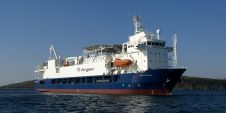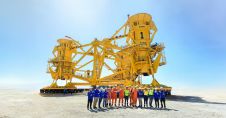Stimulating Science
Recent ocean and coastal policy initiatives in the USA have re-established the link between economic development and science, designed to lead to innovation and job creation. As President Obama stated, “The oceans, our coasts, and the Great Lakes provide jobs, food, energy resources, ecological services, recreation and tourism opportunities, and play critical roles in our Nation’s transportation, economy, and trade […]. We have a stewardship responsibility to maintain healthy, resilient, and sustainable oceans, coasts, and Great Lakes resources for the benefit of this and future generations.” This most recent Presidential directive is designed to stimulate economic development through ocean and coastal science-focused funding.<P>
Historically, it works. There are many examples of successful government-funded science- and engineering-based developments that have led to unimaginable benefits to society and economic development. Two significant examples are the worldwide benefits of GPS satellites and the internet. Not only did these government-stimulated innovations and developments directly provide jobs and economic growth, they spawned continuing beneficial development through creativity and applications likely never dreamed of by the original inventors and policy makers. Current estimates place worldwide internet-based business activity as high as USD10 trillion annually.
Marine geospatial planning on a national scale will likely generate multiple benefits. Many will directly impact those companies and individuals who map, study, analyse, protect and develop ocean, lake and coastal zone resources. Importantly, the increased effectiveness resulting from enhanced resolution and understanding of these resources will contribute to improved understanding and efficiencies in the utilisation of these resources by society and in our economy.
Resource management will be the first beneficiary of co-ordinated research and mapping. Fisheries habitat assessment and sustainable management improvements will be gained through comprehensive regional seabed mapping. Integrated Ocean Observing System (IOOS) and related integrated metocean research will better map, define and predict weather dynamics and upwelling that impact marine transportation, offshore operations and fisheries. Exclusive economic zone (EEZ) resource developments, such as energy (oil, gas, hydrates) and sand or aggregate mining, will also be directly benefited by marine geospatial planning. In addition, renewable resource development applications such as wind, wave and tidal energy will be direct beneficiaries.
Related tools and projects will enhance public safety and security along our coastal zones. For example, improved understanding of tsunami and storm surge run-up and inundation will lead to better coastal zone protection design and building, mitigated destruction and significant benefits for saving lives. Estuary and flood plain research and understanding will need the same focused approach for wildlife protection and coastal resource development. Both topographic and hydrographic studies, as well as metocean-based information, will be required to understand and define sea-level rise impacts and our effective responses to climate change.
As has been demonstrated in recent regional-scale studies, this integrated approach will also directly impact recreational enjoyment and usage for ocean, lakes and coastal activity, including boating, surfing and viewing. Studies initiated by the US West Coast Governors’ Agreement estimate the regional ocean economy at USD32 billion for these three coastal states alone. By stimulating the process through science, we can expect long-term benefits for all aspects of the coastal zone, including economic well-being.

Value staying current with hydrography?
Stay on the map with our expertly curated newsletters.
We provide educational insights, industry updates, and inspiring stories from the world of hydrography to help you learn, grow, and navigate your field with confidence. Don't miss out - subscribe today and ensure you're always informed, educated, and inspired by the latest in hydrographic technology and research.
Choose your newsletter(s)
























